- Home
- Isaac Hooke
Alien War Trilogy 2: Zeus Page 10
Alien War Trilogy 2: Zeus Read online
Page 10
The man was still humming in the adjacent room.
Still lying there, Rade returned his right hand to the clamp that yet constrained his glove. He pulled firmly on the fingers, and wrenched the glove free.
He reattached it to his suit and flipped open the cap on the surgical laser in the index finger. After Rade had seen Bender showing off the surgical laser in the mess hall, he had taken the drone operator aside for a little talk, and Bender had promptly flashed the control chip with a patch that overrode the safety, enabling Rade to power his own surgical laser without a helmet.
He had two options: try to destroy the innards of the locking mechanism, or attempt to cut through the strap. He had to factor in that without his Implant or the helmet, he couldn’t adjust the firing rate or the depth of the laser. The preset was one centimeter, with a burst time of one thousand trillionths of a second.
He pressed the tip of the laser against the locking mechanism.
He pushed upward slightly against the fabric of the glove with his index finger, which manually fired the laser. There was no indication the beam had actually activated. No plume of smoke. No sound. He tried to open the locking mechanism. No good. He had tested the laser after Bender had applied the patch, and it was working fine then. Had it been damaged somehow since then?
The civilian continued to hum nearby. His tone seemed to become more eager by the moment. Rade thought the man must be nearly done refilling the bottle.
Have to hurry.
He fired the surgical laser again, and again. Finally, after his fifth attempt, the lock opened.
Rade immediately removed the metallic strap, slid the vise away from his head, and sat up on the operating table.
Rade touched the clamp that pinned down his left boot, but there was no obvious way to remove it. So instead he opened the latches that secured his boots to the jumpsuit, and he slid his feet out of the footwear.
He slipped off the table, leaving his boots and the lone glove still clamped to the surface. He was right about a depression residing in the center of the table to account for the jetpack; there was a small sliding panel just above it, and he guessed it sealed closed for those prisoners without jetpacks.
An alert tone abruptly pulsed from the Weaver behind him. So it was paying attention after all.
In the other room, the man stopped humming.
Rade glanced at the robot, which still lurked behind the operating table, long needles extended in front of it in a claw pattern. It continued to emit that alert tone, with a red light flashing on and off. The vial lay on the counter beside it, connected to a small machine. Rade’s blood had been drained.
He looked at the Marines strapped into the tables beside him. One male, one female. The woman still had a blaster strapped to her utility belt.
“Sorry, miss,” Rade told the unconscious woman as he removed the weapon. The contours fit his gloved hand perfectly.
Some blasters were “smart” weapons, designed to be operated only by their owners, or members of the same platoon. Most Marines—and MOTHs—deactivated that feature, as it made interchanging weapons during a firefight difficult. He hoped that feature was similarly disabled here.
He pointed at the Weaver and squeezed the trigger.
The beam drilled a two millimeter-wide hole clean through the dodecahedron forming its head. The alert continued.
Rade aimed at the flashing light and fired again. That did it: the light burned out, and the warning tone ceased.
He shot a quick glance toward the doorway to confirm the civilian was nowhere in sight, then he fired at the robot again, aiming for the spot where the power source resided in UC models. Those telescoping limbs drooped.
He gave the Weaver a good kick, toppling it. He unleashed another beam at the device beside the robot that had processed his blood sample.
Next he shot the blaster at the two Weavers that still had needles inserted into the scalps of the Marines. Both robots immediately retracted the long slivers of metal and retreated to the corner of the room. Keeping his eye on the doorway, Rade released a few more shots at either unit until he was certain the robots were disabled.
Rade glanced at the Marines. Though free of the machines, they remained unconscious.
He felt it was partially his fault that the pair had been captured. Those Marines could have been members of the infantry platoon buried in the rubble of the house after the rocket attack. In fact, he thought the woman was the very same Marine he had uncovered from the wreckage. If that was true then he definitely couldn’t leave them: it had been his duty to protect every member of that platoon.
He focused on the doorway.
Before he could rescue them, first he had to deal with the civilian out there.
fifteen
Keeping the blaster extended in front of him, he approached the doorway. He “pied” both sides of the entrance, moving in a left to right then right to left sweeping motion to scan the room beyond, ensuring that no one was hiding against the wall on either side.
The adjacent room looked like the living area of an apartment of some kind. Two brown leather accent chairs squatted in front of a glass coffee table that had a stylized hookah as its only fixture. There was another empty table nearby, along with a cabinet containing some china. But otherwise, like most homes these days, there weren’t any other curios or knickknacks... most personal items and decorations would be virtual, existing in Implants and aReals only. If he actually had a working Implant, and the local network remained online, he would be able to activate the overlays and see paintings and tapestries on the walls, statues in non-existent alcoves, and so forth, as per the designs of the owners.
To the left, behind the coffee table, a polished counter separated the living room from what he guessed was the kitchen. On that counter was a box of cotton swabs, along with several glass bottles filled with different translucent liquids beside a four-liter polycarbonate container. Beyond it was a window—the automatic blinds were closed. To the right he could see a side hallway. Likely led to the foyer.
He glanced over his shoulder once more to make sure none of the machines—or anything else—were sneaking up on him. The occupants hadn’t moved. He noticed an outline on the back wall, then, and he realized those were bricked-up windows—the operating theater had probably been a large bedroom at one point. He wondered vaguely how many other makeshift operating rooms were scattered throughout the city, ready to inject the minds of the captured with nano-machines.
Blaster raised and at the ready, he turned back to the living room, took a deep breath, and stepped inside at a crouch.
Staying close to the wall, he approached the counter. Still no sign of the civilian.
A blur of motion warned him of an attack.
Rade narrowly sidestepped and grabbed a hand that was attempting to touch a sonic injector to his neck. The hand was sourced from the wall itself.
Rade pulled on the wrist and dragged the civilian from the illusory wall. He shoved the injector underneath the man’s chin, hard. The device clicked loudly as the sound waves transferred the drug into his body, and the man became rubber in his arms. He let him drop.
Rade passed his head through the illusory wall and peered into the alcove beyond. Various holographic emitters lined the inner surface. He had heard about these... it was the type of technology that worked well in confined spaces, with emitters specifically designed for the shape and layout of the close surroundings, but it wasn’t something easily transferable to the battlefield. But imagine how different the galaxy would be if soldiers, mechs, and even starships could be disguised as innocuous objects?
We’d rule the galaxy.
Then again, he supposed the camouflage skin of the jumpsuits and mechs worked nearly as well. Too bad the skin wouldn’t function without a helmet or Implant; as it was, the left half of his jumpsuit was permanently colored to match the background of the operating table, and the entire right side remained black due to damage from the earlie
r explosion.
He wondered if he could use the holographic emitters in that alcove to ease his return to the forward operating base... somehow he doubted a lone wall sneaking its way across the rubble of the city would prove very convincing to the enemy.
He stepped back into the living room.
Rade considered killing the civilian, but decided that would serve no real purpose. Besides, the man had probably filled that injector with something that would have kept Rade out for hours. By the time he awoke, Rade would be long gone.
Just to be on the safe side, Rade retrieved the spare cord from his utility belt and quickly bound the civilian’s hands and feet, well aware as he worked that it was possible the man had gotten a message out.
Rade made his way toward the counter, blaster at the ready, intending to clear the rest of the apartment.
His mind registered more motion, this time coming from the side hall that led to the foyer. He dove to the floor and rolled behind the counter.
A thick green tentacle smashed into the floor behind him. Cracks spidered away from the impact zone.
Rade leaned past his cover and fired, pitching the blaster down as he did so, and he sliced the limb in half.
An angry scream arose from the hallway.
More tentacles thrust into the room, slithering across the walls and floor, dragging the body of a small kraken with them. Rade fired again, aiming at the open maw. The beast howled and launched another set of tentacles at him.
Rade ducked behind the counter. Slimy appendages skirted around to grab him, but he unleashed the blaster once more; even though the weapon had only recovered half its charge, because of the range the beam easily sliced off the tentacles, causing fresh shrieks to erupt from the kraken.
To its credit, the beast didn’t back down. It kept coming at Rade, even when he had sliced off the last of its tentacles; its bulbous body crawled along the floor like a madly hissing, amoebic blob, filled with hate for humanity and all it represented. After a few more well-placed shots, Rade finally put the thing out of its misery.
Staring down at the corpse, he was just thankful that his captors hadn’t placed the equivalent of a Centurion at the door. He doubted he would have been able to best a robot, even with the jumpsuit he wore. Not in his current state. He was also glad his captors had neglected to disarm the female Marine.
Once again saved by luck.
Rade wondered what he would do when that luck finally expired.
He hurriedly cleared the rest of the apartment, then paused by the window on the way back. He gestured, and the automatic blinds opened.
He saw that he resided in a more industrial section of the city. The block-light structures of warehouses and factories filled the street, interspersed with apartments like his own. They were made of concrete, not travertine.
His own building was half-buried in the rubble of an adjacent building, which had collapsed into the street. The debris reached almost up to his window.
There’s my escape route. More luck.
He was obviously deep behind enemy lines—there was no sign of the UC out there. He glanced upward, searching for air support. Without an Implant, he had no way of letting anyone know where he was. His image might be caught on camera at some point by UC remote surveillance, but without an Implant to identify him, he could just as easily be mistaken for an enemy by the air support.
He decided the best course of action was to stealthily make his way back to the forward operating base until he encountered a Marine platoon, and hope he could convince them he was a friendly before they decided to take him out.
He just had half an alien-infested city to walk through, that was all.
Stepping delicately over the mangled body of the kraken, he barred the front door with the table and one of the leather accent chairs, then he returned to the operating area and retrieved his boots and remaining glove. The latter he retrieved easily, but the boots took quite a bit of elbow grease, not to mention much levering back and forth, before he freed them from the clamps.
He walked over to the remains of his helmet, hoping he could perhaps salvage the comm node, but the Weaver had destroyed it completely. Too bad.
He went to the Marines, removed their binds with the help of the blaster, and stripped off their jumpsuits, leaving only the cooling undergarments. Unfortunately, their jumpsuits didn’t employ jetpacks, so there was no fuel for him to siphon for his own.
He hauled the male over his left shoulder, the female over his right shoulder, and made his way from the room, crossing to the window. By the time he reached it, he was winded. He lowered the pair to the floor.
Even with the strength-enhancement of the jumpsuit, he knew he wouldn’t be able to carry both of them for any extended period of time out there. He decided he could only take one of them: he elected to go with the woman.
Looking at her, he hesitated. What if she ended up like Lieutenant Vicks, with her mind replaced by nano-machines? He cast his doubts aside: he had to try.
He opened the window, broke away the safety screen, and surveyed the landscape below. The jump to the rubble was about two meters. His jumpsuit would easily break the fall, even with the added weight of the woman, but he was doubtful about how sturdy the rubble would prove underneath him. And once he got down there, then what?
With the window open, he heard the soft din of distant fighting: shouts, the firecracker-like explosion of projectiles, the thunder of electrolasers and detonating bombs... but because of all the buildings, which echoed and reflected the sound, he had no idea where it was coming from.
“Which way?” he asked himself.
A plume of smoke blossomed above the buildings several streets away.
Rade smiled to himself.
He gazed at the rubble below him one last time, still unsure how stable it was. It wouldn’t do, not at all, to leap down there and find himself trapped by debris a moment later.
He glanced at the foyer, toward the door he had barred. The other option was to take the building’s stairwell and attempt to retrace the route the hammerheads had used to bring him there, but he decided that wasn’t the wisest course—the route was probably infested with bioengineered beasts. Not that the street below would be any less dangerous...
He scanned the surrounding buildings, and the street below, searching for signs of alien activity, but the area seemed completely dead. He made up his mind.
He lifted the woman’s unconscious body in his arms, slid his leg assemblies over the windowsill, and then took the two-meter leap to the rubble below.
When he struck, bricks and pieces of concrete slid away around him, but otherwise the debris held.
He carefully picked his way down the pile, carrying the woman in his arms.
sixteen
Rade reached the bottom of the debris and continued through the street. He hugged the walls of the surrounding buildings. The alleyways and open doorways were his havens, and he weaved into and out of the shadows, tediously making his way forward, constantly pausing to survey the route through the rather terrible zoom provided by the blaster. He headed south, or the direction he thought was south. The roads didn’t help with his navigation whatsoever, as the city didn’t follow the “grid system”—the byways were randomly named after famous people from Italy’s past. Vialle Leonardo Da Vinci here. Via Michelangelo Buonarroti there. Roads turned in upon themselves without rhyme or reason. Streets ended in cul-de-sacs. Cities like these were designed for Implants and self-driving vehicles.
The sporadic sounds of battle arose occasionally around him, but he could never tell the direction. He clambered to the rooftops on occasion to keep sight of that clearing smoke plume, his one guiding beacon in that labyrinth, and when the smoke faded, he found another landmark visible from the rooftops to reorient himself—sometimes a building with a special feature, such as a statue or spire, other times another plume of smoke, when the bombers were so kind.
He spotted what he thought was a robot
sniper in a window one time, and he took a shot at the tango from cover. When pottery shards scattered the windowsill beneath the target, he realized he’d just attacked a plant.
He continued forward that way, carrying the woman, pausing every half hour to rest his arms. He touched her forehead to check the fever he had noticed shortly after reaching the streets. It seemed to be getting worse: her head was just burning up. She was certainly sweating profusely, as if her body was fighting off some terrible disease. Rade began to worry more and more about the potential biohazards he was exposing himself to out there.
About an hour and a half after leaving the apartment, the sun set, and he continued on into the night. The stars shone brightly overhead, the constellations strange and unfamiliar.
He wasn’t sure if he was headed in the right direction, because soon he began to encounter patrols of alien robots. Sometimes they gave ample warning, servomotors buzzing loudly before rounding a bend, and at other times he came upon them completely by surprise, and it was sheer luck that he was near suitable cover.
The patrols appeared with increasing frequency, and soon he became certain he was moving farther and farther away from the UC forward operating base, and perhaps toward some alien camp. So he doubled-back and attempted to stay on his new course by navigating via the foreign constellations. It was a task that proved fruitless, because he found himself crossing the same square three times—he knew because of the distinct obelisk at its center that was missing a chunk from the lower half.
It would have been near midnight, standard time, by then. As he was trying to decide whether to proceed or call it a night, the subtle hum of servomotors forced him to take cover in a nearby abandoned house. He carried the woman upstairs and set her down to observe the intruders from a second floor window.
A group of three scorpion robots passed by below, barely visible in the starlight. As they passed out of view at the far end of the street, flashes of light drew his gaze to an outbreak of fighting taking place several streets away. He guessed the skirmishers were about five kilometers distant.

 Warden 2
Warden 2 Devastator
Devastator Warden 4
Warden 4 Emperor
Emperor Mech
Mech Conqueror
Conqueror Fighter
Fighter The Forever Gate Ultimate Edition
The Forever Gate Ultimate Edition Defiler
Defiler Mech 2
Mech 2 Warden 3
Warden 3 Warden 1
Warden 1 Mech 3
Mech 3 Forerunner
Forerunner The Alliance (AI Empire Book 2)
The Alliance (AI Empire Book 2) Breaker (Monster Tamer Book 1)
Breaker (Monster Tamer Book 1) Bender of Worlds
Bender of Worlds The Pendulum Swings (The Forever Gate Book 8)
The Pendulum Swings (The Forever Gate Book 8) The Link
The Link Just Another Day
Just Another Day Star Warrior
Star Warrior Alien War Trilogy 1: Hoplite
Alien War Trilogy 1: Hoplite Battle Harem 3
Battle Harem 3 The Ethan Galaal Series: Books 1 - 3
The Ethan Galaal Series: Books 1 - 3 Reloaded
Reloaded Robot Dust Bunnies (Argonauts Book 5)
Robot Dust Bunnies (Argonauts Book 5) Battle Harem
Battle Harem ATLAS 3 (ATLAS Series Book 3)
ATLAS 3 (ATLAS Series Book 3) Argonauts 2: You Are Prey
Argonauts 2: You Are Prey Worlds at War (A Captain's Crucible Book 5)
Worlds at War (A Captain's Crucible Book 5)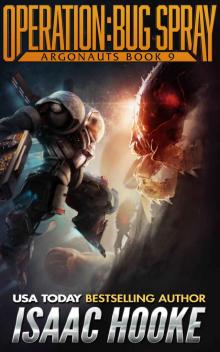 Operation: Bug Spray (Argonauts Book 9)
Operation: Bug Spray (Argonauts Book 9) Battle Harem 2
Battle Harem 2 Redeemed (Bolt Eaters Trilogy Book 3)
Redeemed (Bolt Eaters Trilogy Book 3)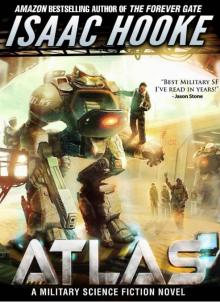 Atlas
Atlas Argonauts 1: Bug Hunt
Argonauts 1: Bug Hunt Reactivated (Bolt Eaters Trilogy Book 1)
Reactivated (Bolt Eaters Trilogy Book 1) Alien War Trilogy 3: Titan
Alien War Trilogy 3: Titan Flagship (A Captain's Crucible #1)
Flagship (A Captain's Crucible #1)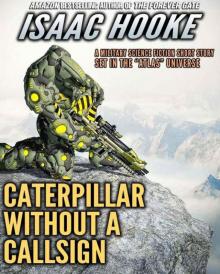 Caterpillar Without A Callsign
Caterpillar Without A Callsign The Forever Gate
The Forever Gate He Who Crosses Death (Star Warrior Quadrilogy Book 3)
He Who Crosses Death (Star Warrior Quadrilogy Book 3) Reforged (Bolt Eaters Trilogy Book 2)
Reforged (Bolt Eaters Trilogy Book 2) Refurbished
Refurbished Reloaded (AI Reborn Trilogy Book 2)
Reloaded (AI Reborn Trilogy Book 2) He Who Crosses Death
He Who Crosses Death Explorations: First Contact
Explorations: First Contact Planet Killer (A Captain's Crucible Book 4)
Planet Killer (A Captain's Crucible Book 4) Quantum Predation (Argonauts Book 4)
Quantum Predation (Argonauts Book 4) Clandestine-IsaacHooke-FreeFollowup
Clandestine-IsaacHooke-FreeFollowup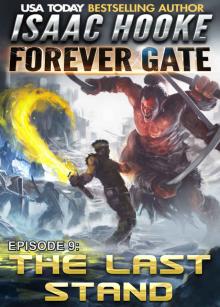 The Last Stand (The Forever Gate Book 9)
The Last Stand (The Forever Gate Book 9) City of Phants (Argonauts Book 6)
City of Phants (Argonauts Book 6) Test of Mettle (A Captain's Crucible Book 2)
Test of Mettle (A Captain's Crucible Book 2) Cradle of War (A Captain's Crucible Book 3)
Cradle of War (A Captain's Crucible Book 3) Rade's Fury (Argonauts Book 7)
Rade's Fury (Argonauts Book 7) Rebirth (The Forever Gate Book 6)
Rebirth (The Forever Gate Book 6) The Forever Gate Compendium Edition
The Forever Gate Compendium Edition Mechs vs. Dinosaurs (Argonauts Book 8)
Mechs vs. Dinosaurs (Argonauts Book 8) Alien War Trilogy 2: Zeus
Alien War Trilogy 2: Zeus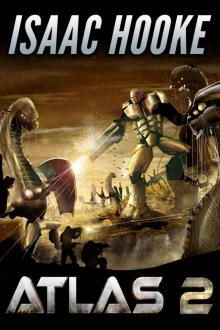 ATLAS 2 (ATLAS Series Book 2)
ATLAS 2 (ATLAS Series Book 2) Operation_Bug Spray
Operation_Bug Spray